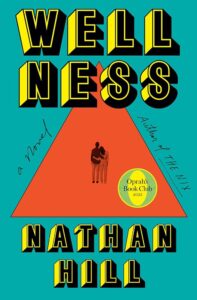Fiction. 624 pgs. Knopf. September 2023. 9780593536117.
 Wellness tricks you into thinking it’s going to be a love story. The brilliant novel starts out alternating perspectives between a boy watching a girl through his apartment window, and the same girl watching the same boy through her apartment window. It’s Hitchcockian kismet. Voyeuristic yearning. Both boy and girl fantasize about the other, projecting bashfully insecure narratives in his and her minds that self-eliminate the possibility of love. He comes from Kansas, a small-town boy who believes he’s too uneducated for the cosmopolitan girl with the overflowing bookshelves; she watches him develop film photos while smoking his crusty punk cigarettes and laments her bourgeois conformity. Meanwhile, 1993 Chicago is changing around them. A friend introduces the boy to the Internet; a Starbucks replaces another indie coffeeshop.
Wellness tricks you into thinking it’s going to be a love story. The brilliant novel starts out alternating perspectives between a boy watching a girl through his apartment window, and the same girl watching the same boy through her apartment window. It’s Hitchcockian kismet. Voyeuristic yearning. Both boy and girl fantasize about the other, projecting bashfully insecure narratives in his and her minds that self-eliminate the possibility of love. He comes from Kansas, a small-town boy who believes he’s too uneducated for the cosmopolitan girl with the overflowing bookshelves; she watches him develop film photos while smoking his crusty punk cigarettes and laments her bourgeois conformity. Meanwhile, 1993 Chicago is changing around them. A friend introduces the boy to the Internet; a Starbucks replaces another indie coffeeshop.
The boy and the girl finally have their rom-com meet-cute at a dive bar. She’s on a bad first date with a mansplaining film dude (we all know the type). When she asks, “On a scale of one to ten, how much would you say your parents loved you?”, her date laughs before leaving for another beer. In the background, Liz Phair performs “Exile in Guyville” while she spies on the boy in the window, who’s taking photographs around the venue, unaware. After she removes the scarf hiding her face (it’s Chicago in the winter, after all), he spots her (finally!, the reader cheers) and sweeps her away. The narrative unspools predictably and comfortably from there: the reader understands, from our own Disney-fueled upbringings, that this is the inevitable manifestation of all that pining. We understand they are soulmates, this boy and girl, who have been slowly falling in love with the idealized versions of each other for months.
This belief is solidified after their Before Sunrise-coded night, where they talk and talk and talk and talk, the familiar feeling of giddy connection described through Nathan Hill’s wonderful exposition: “It’s an altogether manic and ceaseless conversation, a conversation that feels sometimes like falling down stairs, barely keeping upright, taken by gravity, skipping, grasping, and then somehow landing, magically on one’s feet, intact and triumphant.” When she asks him the same question, “On a scale of one to ten, how much would you say your parents loved you?” the boy from the window does not scoff, but shares vulnerably.
They kiss, we cheer. Happily ever after—right? Love is, after all, a magic trick—a disappearing act of flaws and neuroses we want to believe in.
The bulk of the novel takes place 20 years after that fated night, in 2015. The boy and the girl, now man and woman, are Jack and Elizabeth. They are also husband and wife, father and mother, and recent homeowners, having spent their life savings on a forever home. Their marriage is stale, quotidien—boring. The spark that once sustained a fiery romance has been reduced to withering embers. Jack and Elizabeth still love each other, out of habit. When planning their forever home, separate bedrooms in separate wings are discussed as a contingency plan. There have been no overt rifts but rather the simmering conflicts of no sex, poor communication, emerging incompatibilities, and the comfortable laurels of a sparkling origin story.
“Nothing really happened, or nothing in particular, as far as I know. They just stopped feeling as strongly as they once did. It’s that thing, I suppose, that happens to so many couples. The passion faded, the spark died. There really ought to be a name for that.”
Jack and Elizabeth are squarely situated at the bottom of what is referred to as the U-shaped curve:
“It was a phenomenon well known among certain economists and behavioral psychologists, that happiness, in general, over a lifetime, tended to follow a familiar pattern: people were most happy when they were young and when they were old, and least happy in the middle. It seemed that happiness spiked around age twenty, spiked again around age sixty, but bottomed out in between, which was where Jack and Elizabeth now found themselves, at the bottom of that curve, in midlife, a period that was notable not for its well-publicized “crisis” (actually a pretty rare phenomenon—only 10 percent of people reported having one) but for its slow ebb into a quiet and often befuddling restlessness and dissatisfaction.”
Elizabeth is a logical matriarch; her M.O. is attacking any issue from all angles through meticulous research. She’s not a bored housewife, but “no longer seduced by the mystery of it all. Life’s big hard questions — What will happen? Who will I become? — have largely been answered. And now I feel like there’s this huge absence where the mystery used to be. And I guess that’s really what I’m after.” Jack, on the other hand, is more freeform. He’s a failed artist and mediocre professor, having worked on the same series of photographs for over a decade that achieved no real acclaim or fortune. His teenage boy metabolism has slowed—gradually, then all at once. His wife’s dissatisfaction torments him and he spins his tires at trying to fix an unfixable, existential problem. Jack’s anxious attachment was painfully relatable, exacted with kindness and elegance, folding in the gentle reminder that “if you cling too hard to what you want to see, you miss what’s really there.”
This compassion is Wellness’ fundamental beauty—it is a book that fundamentally believes in humanity. Even the delusional and judgy Christian mommy and Jack’s conspiracy-theorist conservative father get generous slices of the reader’s sympathy. Wellness understands that there is no black and white, that all humans are painted in shades of splotchy and messy contradictions and paradoxes. “When I see people on Facebook express their loud inflexible certainty about some political thing,” Hill writes, “what I believe they’re actually saying is I am in great pain, and nobody is paying attention.”
There’s a particularly memorable and torturously accurate scene that dissects the kind of fight any experienced couple can relate to; it’s the kind that starts innocuously but ends up a full-blown teardown of each other’s core characters, rich with unspoken subtext and baffling escalation. The double-edged sword of marriage is that to be known so comprehensively means that vulnerabilities and insecurities can be weaponized and exploited. The scene is delicious to read, with Hill giving a parenthetical play-by-play like a sports broadcaster.
What was delightful about Hill’s prose was that it seemed like he had fun writing it. As a result, the reader has fun reading it. I laughed out loud whenever Elizabeth kisses her 8-year old goodnight and instead of sweet dreams, whispers: “Don’t forget to like and subscribe.” Jack and Elizabeth feel like real people—the cool parents you would get a glass of wine with after the PTA meeting. I can imagine their trip to Disneyworld with prodigious precision (Elizabeth would stalk the most efficient routes via the app’s FastPasses while Jack would snap photos of their son in a Mickey Mouse hat holding a pretzel). Although the novel can sag under its own weight, the realness of these characters is achieved through the high level of specificity and backstory.
The main storyline is of a marriage in crisis but the 624-page novel is laden with side quests around polyamory, pop psychology, wellness culture, social media, and gentrification. Detailed chapters about Elizabeth’s baron-rich and white supremacist family provided important context but can be skipped without losing much from the story. Meanwhile, the section from Jack’s dad’s perspective about falling deep into the rabbit hole of Facebook algorithms was delightfully dystopian and emotionally devastating to read.
Wellness is, at its best, a satire. It pokes fun at recognizable promises that this one life hack will save your marriage, that this yoga class can prevent your nervous breakdown. The products we buy ourselves thinking they will change our lives when really, we know they won’t make that much of a difference at all. Wellness accepts truth as an elusive concept in our modern information age. How should parents know the right way to raise children when one source says zig and another says zag? Hill’s meticulously researched novel, which includes a seven-page bibliography at the end, excels at documenting the information overload of daily living.
Eventually, everything loops back around. Seeds planted in early chapters break from frosty topsoil to bloom into shy flowers. Even the question Elizabeth asks during the fateful first date reemerges with additional context later in the book. At times clever, other times too tidy, but always charming.
Despite the novel’s heft, I still wanted more when I finished. Wellness isn’t a love story in the traditional sense, ending when the male and female leads kiss for the first time, but it does end up being a story about love. It asks: “What happens after happily ever after?” The answer is not that happily ever after is a myth; rather, happily ever after is a choice we consciously make day in and day out.
Love is not sweeping, but quotidian. Love is knowing another’s flaws and forgiving them for it. Love is a commitment to mundanity. Hill writes, “Beyond all the poetry, beyond all the songs, love is this, my dear: it’s an expansion of the self. It’s when the boundaries of the self spread out to include someone else, and what used to be them now becomes you.” How wonderfully, tragically, beautifully, and realistically hopeful.
Wellness is available through Knopf. Purchase it now through your local bookstore.
Like what you’re reading?
Get new stories or poetry sent to your inbox. Drop your email below to start >>>
NEW book release
Direct Connection by Laura Farmer. Order the book of stories of which Mike Meginnis says there is “an admirable simplicity at their heart: an absolute, unwavering confidence in the necessity of loving other people.”
GET THE BOOK

![REVIEW: [Title] by [name of author]](http://www.bridgeeight.com/wp-content/uploads/2022/05/1447227775.0.x-193x300.jpg)
